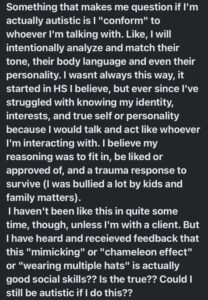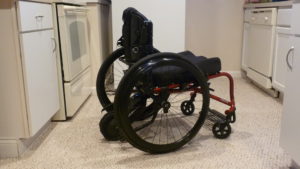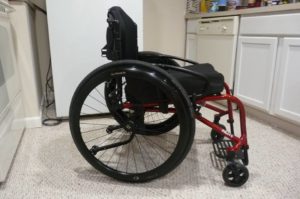This is a (very slightly) modified version of a post I put on Patreon. There is more on this topic elsewhere on the blog, and still more to come. This is an important topic to me. I want you parents to know that I stand with you. It isn’t that I just want to say, “We’re not all like that,” I want to prove it. Hopefully this piece below will help with that.
Today I want to talk about speaking for your child and why it is okay to do that.
This really isn’t all that difficult. You are the parent. You can speak for the child. If you have legal custody of your child, you can (and should and even must) speak for them. Not only that, it is your responsibility as a parent. Speaking for your child does not make you a bad parent, it is not speaking for your child that makes you a bad parent. Your job as a parent is to protect your child. This is what a good parent does.
No one knows your child better than you do. If you gave birth to (or adopted or otherwise have) this child, if you raised them, if you love them, who else has that right?
I know you are being told you have no right to speak for your child, this just isn’t true. You absolutely do. Custody alone gives you that right. No stranger on the internet can take that from you just because they said so.
Now this doesn’t mean your kids can’t speak for themselves, indeed they can if they are able. I mean I can’t really blame them if they speak and say they’d rather not have the vegetables during dinner. (Of course at that point you as the parent can speak for yourself and say they eat them anyway or no cookies for dessert if you so choose. On a more serious note, if they are able to speak for themselves, please consider allowing them that.)
That out of the way, not only are you are being told that you cannot speak for your child, you are also being told that only a small and specific group of strangers on the internet can speak for your child. Strangers who not only have a proven dark history of delight in cruelty, but who also do not know the first thing about your child.
For instance…
How old are your kids?
When is their birthday?
What is their diagnosis?
What kind of medical history do they have?
What medications are they on?
What kind of symptoms are they experiencing?
What is their bedtime routine?
What is their favorite color?
What is their favorite TV show or DVD?
What calms them down when they are frightened?
Who are their friends?
What do they like to do during the day?
Do they have an IEP?
What is in the IEP?
Is the IEP being followed?
Is there any violent or inappropriate behavior?
Do we know the reason this behavior is occurring?
Do they have any diagnosed co-occurring conditions?
How are those co-occurring conditions being managed?
Strangers floating around out there on social media don’t know these things. How can they effectively advocate for your child? And being that you don’t know them and they are making demands, would you even trust them with this?
As I have said before (and I repeat it yet again because I cannot stress this enough) advocacy requires that you look at everything. You cannot get on social media and start making demands about people and situations you know nothing about. That way lies madness and is doomed to fail. I spend time with the family and with the child, with the teachers and with the therapists. That information I am given, sensitive and delicate as it is, this is needed for effective advocacy. The advocate must know the history and the needs of the child they are advocating for, elsewise the advocacy itself will not be successful or effective. The advocate cannot be someone the family has never heard of making unreasonable demands while hiding behind the internet. That will not in any way help you or your child. That will only create a lack of trust which will keep you awake at night. You don’t need that.
Advocacy, by it’s very nature, is an intimate thing. Mutual trust between the parent and advocate is absolutely essential to success. Mutual trust between the advocate and the child also helps, that will require trust from the parent. If the parent does not trust the advocate, the advocacy cannot succeed.
Most of the time I was able to leave the child and the family in a better place than they were when I arrived. The reason I was mainly successful is because I didn’t go into this blind. I know every child is different. Just because I was once a child with autism, that doesn’t mean I was your child with autism. I know that even among those with autism, I am unique. I know that what I needed to do in that work was not what would be right for me, but what would be right for your child.
These are two very different things. Anyone who believes all autism is the same and that they automatically already know everything there is to know about your child because they themselves have a diagnosis (be it real or imagined) just isn’t worth your time.
How can you advocate for an effective IEP without knowing the specific educational needs of the child? Just because I had educational needs once, that doesn’t mean your child’s needs are the same as mine.
How can you advocate for effective medical treatment if you don’t know the child’s medical history and diagnosis? Just because I have a medical history and diagnosis, that doesn’t mean your child’s history and diagnosis are the same as mine.
How can you advocate for effective therapies when you don’t know the child’s therapeutic needs? Just because I had therapeutic needs, that doesn’t mean your child’s therapies are the same as mine.
See a pattern here? One child may benefit from Occupational Therapy, one may benefit more from Speech Therapy, one may even benefit from some form of proper and appropriate ABA. One may benefit from a combination of any two or all three. One may benefit from something else. Every child is different. You need to know them (and you also need the right kind of training and experience to understand how to accomplish effective advocacy) before you do anything. Don’t you believe some stranger on the internet can do all of this for you just because they said so. Your child deserves better than that.
And so do you.
If someone you don’t know (or even someone you do know) actually tells you that you have no right to raise or speak for your kids and they do, the only response is to block them immediately. You don’t need that kind of bullying and BS in your life. You have enough to deal with as it is. The only possible way that can be valid is if they have custody of the kids and you do not. Those two conditions must be met for this to be true. So if this isn’t the case, block them and move on.
If all they are is someone who woke up one day and proudly diagnosed themselves with autism, you absolutely need to look elsewhere. If they are an established professional advocate, autistic or not, and you are looking for an advocate, you can consider it. But you need to do your homework. You need to ask the tough questions and they need to be willing and able to respond with answers. Also check any web site or social media pages they have to see what kind of experience they have and that they are right for you.
Keep in mind (and this is important) this is your child’s life they are messing with. You cannot get much more sacred than that. Protect your children from those who would do them harm.
I have nothing to hide. I have had my good and bad moments of advocacy. I have improved the lives of many, saved the lives of a few, and yes there were a couple along the way that for whatever reason I just wasn’t able to help at all. I freely admit to all of this. If someone wants to hire me, I’ll answer their questions and I’ll be honest. If they don’t think I am the right fit, they can look elsewhere. You as the parent need to trust your gut. If you think I’m the wrong person for your particular situation, there’s a real possibility that I am. If you think I’m right for you, we can talk.
If you feel you need an advocate, the most ideal way to find one is to get a referral. Ask at a local support group meeting or ask a friend you trust who they had and if they were happy with them. You can also ask one of your child’s teachers or doctors or therapists. They may be able to give you some suggestions for someone near you who knows what they’re doing.
Or – you as the parent can speak for your child yourself. Consider trying this first, then consider an advocate if that doesn’t work out. It won’t always. Sometimes parents are too close to the situation. That’s okay. That’s why advocates are there.
So – having established that you actually can speak for your child (and if you have legal custody, you absolutely have the right, no matter what any internet strangers say), the next obvious question is: how do you speak for your child? You want to do it in a way that is effective and that will benefit your child, yourself, and your family. And you want it to be appropriate to your child’s wants and needs. So how do you do that?
I’ll get to that. I promise. Stay tuned.
— Thomas



